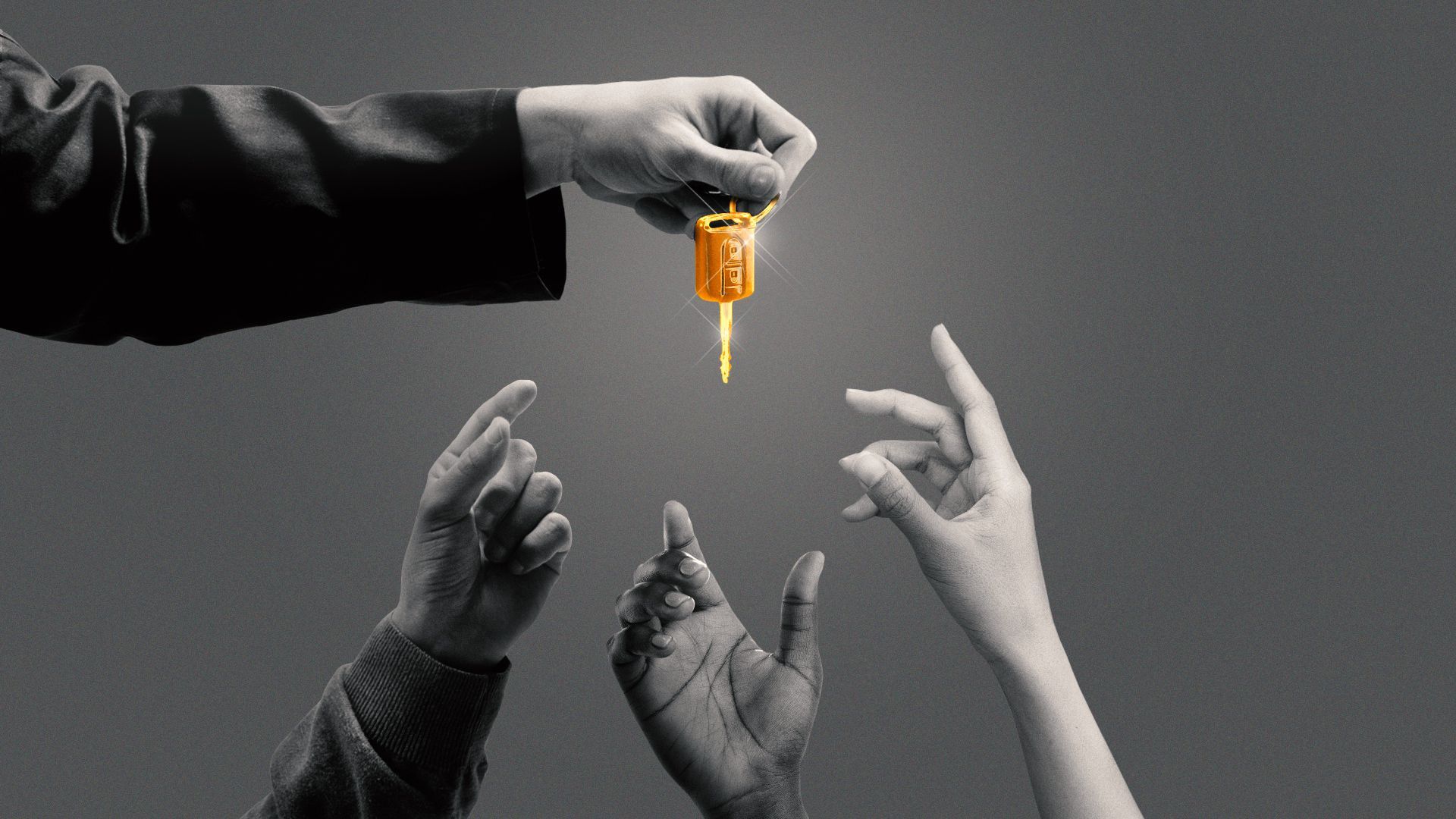| | | | | | | Presented By THE NORTHERN TRUST INSTITUTE | | | | Axios Markets | | By Matt Phillips and Emily Peck · Jul 14, 2022 | | 🛍 Good morning, fellow consumers! It's Emily. I'm still mulling over yesterday's CPI report, which showed prices soaring in June. A definite downer for those who buy things. - Home fuel prices increased a stunning 98% from last year — leaving this suburban New Yorker pretty psyched about locking in her oil price this spring. Sometimes it pays to hedge!
But that's enough bragging (sorry Matt). On to the show. Today's newsletter, edited by Kate Marino, is 1,199 words, 5 minutes. | | | | | | 1 big thing: Car companies learn to love supply problems |  | | | Illustration: Gabriella Turrisi/Axios | | | | Car manufacturers and dealers are making more money by selling fewer vehicles at higher prices — and this could be a lasting transformation for the U.S. auto industry, Matt writes. The big picture: After the chaos and disruption of the pandemic, sales and production of vehicles in the U.S. remain well below pre-COVID levels. - The annual rate of U.S. retail vehicle sales is now hovering around 13.5 million, down about 22% from the 17.5 million in 2019.
- New vehicle inventories at dealers are incredibly low, with just 1.1 million cars available at the end of June. In 2019, there were more than 3.5 million in stock.
The intrigue: Making and selling fewer cars might seem to be a bad thing if your job is making and selling cars. - But for vehicle makers and dealers, the new system is working out pretty well for a very simple reason: price.
- Prices of new and used cars are up roughly 30% since the end of 2019, according to consumer price index data.
By the numbers: The price surge has more than offset revenue declines from the slump in unit sales, resulting in strong profitability for both automakers and dealerships. - Last year, GM booked $10 billion in profits, its best performance in over a decade. It's projecting profits of $9.4 billion to $10.8 billion this year.
- Ford posted operating income — profits from its core car-building business — of $10 billion last year. It was the company's best performance since 2016, despite producing 6% fewer cars than the previous year.
- Dealers are also raking it in, as soaring prices have inflated their profit margins. In a recent survey of auto dealer franchises by Cox Automotive, over 82% of respondents said profits were strong, despite a dearth of cars to sell.
 Data: Cox Automotive; Chart: Axios Visuals State of play: The supply chain recovery story — mostly focusing on the availability of semiconductors — may obscure the reality that the auto industry may never return to its before-times patterns. - Instead, we could be seeing the birth of a new business model, emphasizing lower production levels, higher prices and fatter profit margins.
"It works fine for automakers and dealers," says Michelle Krebs, an analyst with Cox Automotive. "They're not going to be in a rush to go back to the old way of doing things. And in fact, we don't think we'll ever go back." Yes, but: There's one group that's likely to be unsatisfied with the new status quo: consumers. - The average price for a new car in June was $48,000 — a new record, according to Cox.
The bottom line: "The new car market has really become a luxury market," says Krebs. "A lot of Americans are frozen out of it." |     | | | | | | 2. Catch up quick | | 💸 Crypto lender Celsius files for bankruptcy. (CNN) 🌾 Ukraine, Russia make progress in grain export talks. (AJ) 🏦 JPMorgan earnings miss Wall Street expectations. (CNBC) |     | | | | | | 3. GOP thaws on paid family leave |  | | | Illustration: Maura Losch/Axios | | | | Paid family leave from work — traditionally a Democratic priority — is getting a renewed look from some Republicans in the wake of the Supreme Court ruling overturning Roe v. Wade, Emily and Axios' Sophia Cai write. Why it matters: Republicans urgently want to establish themselves as pro-woman and pro-family, as critics accuse the party of caring about children only before they're born. The big picture: The U.S. is one of only six countries that doesn't guarantee paid leave to new mothers. And of the states that have banned abortion in the wake of the Supreme Court's ruling, none have a leave policy. "We're going to have to step up and do more. And I think that people are prepared to do that," Senate Minority Whip John Thune (R-S.D.) told Axios. - "We have to start thinking in terms of some of these things. Now that Roe has been overturned, to be more supportive of families and mothers," Sen. Charles Grassley (R-Iowa) told Axios.
- "We should at least be providing as much help to women who decide to keep their child as those who decide to terminate the pregnancy," Sen. Marco Rubio (R-Fla.) told Axios.
How it works: Democratic proposals are typically structured as tax-funded payments straight to workers. But Republicans have long opposed this framework. - They're more interested in policies that wouldn't raise spending, those that borrow from Social Security funds, foster the creation of new kinds of private leave insurance, or provide tax credits.
Go deeper. |     | | | | | | A message from THE NORTHERN TRUST INSTITUTE | | Prices, policy and portfolios — your questions answered | | |  | | | | Protect your portfolio against inflation with answers to common investor questions. The impact: Better understand the impact of inflation and how to fortify your portfolio and wealth plan in the face of uncertainty. Get the answers you need. | | | | | | 4. The Fed's rent pickle |  Data: Bureau of Labor Statistics; Chart: Axios Visuals The average price of a rental apartment in Manhattan surged above $5,000 in June for the first time, hitting $5,058, according to a report from brokerage firm Douglas Elliman out today, Emily writes. Why it matters: Manhattan is ultra-expensive — typically an outlier — but in this case it's on-trend. Rents are up across the country, as soaring mortgage rates keep potential homebuyers stuck in the rental market. - "You have a whole cohort being steered into rentals," says Jonathan Miller, the CEO of appraisal firm Miller Samuel who authored the Elliman report.
- New Yorkers may still be avoiding the office, but they want to live in the city, he said. Demand is surging, and is expected to intensify this summer, he said.
The big picture: This points to a conundrum. The Fed is raising rates to cool inflation. But rate hikes are driving higher rents, which are fueling inflation. Zoom out: Across the country, rents were up 0.8% in June from the prior month — the largest monthly jump since 1986, according to yesterday's blazing hot CPI report. They've increased 5.6% since last year. - If those numbers seem low — after all there are headlines about 40% rent increases — it's because the CPI measure includes renewal rents, the price you pay when you renew your lease. Many popular rent measures only look at asking rents for new renters.
|     | | |  | | | | If you like this newsletter, your friends may, too! Refer your friends and get free Axios swag when they sign up. | | | | | | | | 5. Wagering on 1 percentage point |  Data: CME; Chart: Axios Visuals Yesterday's scorching inflation data made betting on a more aggressive Fed one of Wall Street's hottest wagers, Axios' Kate Marino writes. What happened: A day and a half ago, market odds that the Fed would hike its key interest rate by a full percentage point at its July meeting were basically at zero, according to Fed funds futures tracked by CME Group. - As of this morning: The chances are about 87%, at last glance.
State of play: The central bank hasn't raised the Fed funds rate by a full point in the modern era of monetary policy, which goes back to the early 1990s when it began announcing a target rate. - But, but, but: Judging from the futures market, some think the June CPI reading — which showed prices rising by more than 9% over the last year — was a game changer for the July policy decision.
Go deeper: America's inflation problem gets worse |     | | | | | | Bonus chart: T-bond volatility |  Data: FactSet; Chart: Axios Visuals After the inflation report came out at 8:30 yesterday morning, 10-year Treasury yields immediately shot up, in expectation of greater Fed hawkishness, Axios' Felix Salmon writes. - Then, at 10am, the yield shot straight back down again — on effectively no news.
💭 Our thought bubble: More hawkishness cuts both ways. It means higher overnight rates — but it also means lower growth and lower inflation. - Yesterday's Treasury bond volatility shows that even the most liquid and efficient market in the world can take a while to fully digest important new information.
|     | | | | | | A message from THE NORTHERN TRUST INSTITUTE | | Market Currents podcast: listen now | | |  | | | | Market Currents, a new podcast from the Northern Trust Institute, explores today's most hotly debated investment topics. What's in it for you: Listen as Wealth Management CIO Kate Nixon and guests use evidence to answer big market questions and provide the insight you need. Learn more. | | | | 🎧 1 thing Kate recommends: NPR's "Planet Money" podcast recently tackled one of America's most vexing current questions … How will we know when we're in a recession? It's not as simple as the age-old two-consecutive-quarters-of-negative-GDP-growth test. They explain why it's a little more complicated — along with who decides and how it all goes down. Take a listen. |  | | Why stop here? Let's go Pro. | | | | | | Axios thanks our partners for supporting our newsletters. If you're interested in advertising, learn more here.
Sponsorship has no influence on editorial content. Axios, 3100 Clarendon Blvd, Arlington VA 22201 | | | You received this email because you signed up for newsletters from Axios.
Change your preferences or unsubscribe here. | | | Was this email forwarded to you?
Sign up now to get Axios in your inbox. | | | | Follow Axios on social media:    | | | | | |













No comments:
Post a Comment